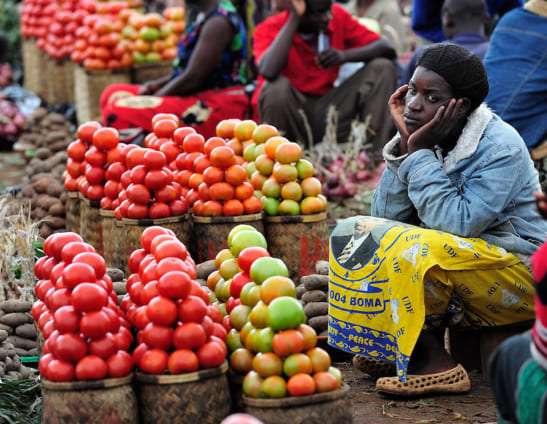The Ghana Statistical Service (GSS) has revealed that the national inflation rate for November 2024 experienced a marginal increase, climbing to 23% from October’s figure of 22.1%.
This rise was largely attributed to surging prices of key food items in the market over the past month. While food inflation played a significant role in driving the overall inflation rate upwards, non-food inflation recorded a notable decline during the same period, signaling a nuanced economic trend.
Inflation, as measured by the Consumer Price Index (CPI), reflects changes in the cost of a basket of goods and services over time. For November 2024, food inflation rose to 25.9%, up from 24.6% in October. This increase was influenced by escalating prices of staple food items, which form a large portion of household expenditures. Conversely, non-food inflation dropped from 21.5% in October to 20.7% in November, driven by stabilizing prices in sectors such as transportation, clothing, and utilities.
The divergence between food and non-food inflation underscores the complexity of inflationary pressures in Ghana. While food inflation climbed, the decrease in non-food inflation suggests that interventions in certain non-food sectors may be yielding positive results. However, the overall increase in inflation highlights persistent economic challenges that need to be addressed.
Impact of Imported and Locally Produced Goods
The data also revealed contrasting trends in inflation for locally produced and imported items. Inflation for locally produced goods rose from 24.6% in October to 25.4% in November, reflecting higher production costs. This increase could be linked to factors such as fluctuating energy costs, supply chain inefficiencies, and rising input prices for agricultural and manufactured goods.
On the other hand, inflation for imported goods also surged, reaching 17.6% in November compared to 16.3% in October. The depreciation of the Ghanaian cedi against major trading currencies may have contributed to this rise. Imported items, including food, electronics, and pharmaceuticals, became more expensive, exerting upward pressure on inflation.
Food inflation remains a pivotal factor influencing Ghana’s inflation dynamics. The rise to 25.9% in November reflects ongoing challenges in the agricultural sector, including inadequate supply, post-harvest losses, and climate-related disruptions. Prices of staples such as maize, rice, and vegetables saw marked increases, straining household budgets.
Efforts to stabilize food prices through policies such as subsidizing agricultural inputs, investing in storage facilities, and enhancing market access for farmers could mitigate future inflationary pressures. The government and stakeholders in the agricultural sector need to prioritize these measures to ensure a stable food supply and affordability.
Policy Implications and Economic Outlook
The marginal increase in overall inflation to 23% poses critical questions for policymakers. The Bank of Ghana (BoG) may need to reassess its monetary policy stance, particularly in relation to the policy rate, which influences borrowing and lending costs. A rise in inflation could prompt the BoG to maintain or tighten its monetary policy to curb demand-driven inflationary pressures.
Additionally, the government’s fiscal policy will play a crucial role in addressing inflation. Strategies to reduce the budget deficit, manage public debt, and enhance revenue mobilization will be essential in stabilizing the economy. Investments in infrastructure, particularly in agriculture and industry, could also help address structural challenges contributing to inflation.
What Does This Mean for Ghanaians?
The rise in overall inflation, driven primarily by food prices, has direct implications for households and businesses. Rising costs of essential goods erode purchasing power, making it harder for families to meet basic needs. Businesses, particularly small and medium-sized enterprises (SMEs), face increased operating costs, which could impact their profitability and growth.
Consumers may need to adjust their spending habits, prioritizing essential goods over discretionary items. Meanwhile, businesses could explore cost-saving measures and seek efficiency improvements to navigate the challenging economic environment.
While the decline in non-food inflation offers some relief, the overall rise in inflation underscores the need for sustained and coordinated efforts to address Ghana’s economic challenges. Tackling the root causes of food inflation, stabilizing the currency, and fostering an environment conducive to economic growth will be essential for ensuring long-term stability.
As Ghanaians brace for the festive season, which often sees increased demand for goods and services, stakeholders must remain vigilant to avoid further inflationary pressures. Collaborative efforts between the government, private sector, and development partners will be key to achieving a balanced and resilient economy in the months ahead.
READ ALSO: MTN Ghana Leads as GSE Closes with Gains in a Quiet Trading Session























